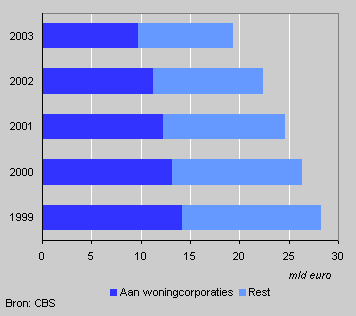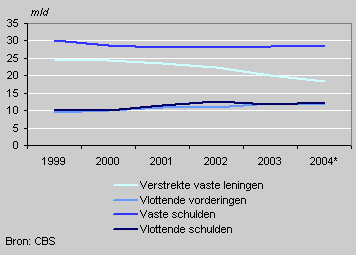Municipal EMU deficit rises to 2.8 billion

The EMU deficit of Dutch municipalities came to 2.8 billion euro in 2004. The municipalities thus accounted for more than a quarter of the total Dutch government deficit.
Contribution by municipalities to government EMU surplus/deficit

The deficit of the municipalities has increased substantially in recent years. In 2000 their revenues and expenditure were just about balanced. In the four subsequent years together they fell short by a total 7.6 billion euro. The main reasons for this were high spending on fixed capital formation and on land, accompanied by disappointing revenues from the sale of land because of the economic dip. How have municipalities financed this substantial gap between expenditure and revenues?
Long-term lending down sharply
To an important extent municipalities have financed their deficits by cutting back on long-term lending. In the period 2000-2004 long-term lending has been reduced by 6.0 billion euro to 18.3 billion in 2004. The main reduction was for long-term loans granted to housing corporations.
Loans to housing corporations and other long-term lending

More short-term lending
Short-term loans granted by municipalities rose by 2.1 billion euro in the period 2000-2004, to 11.7 billion in 2004. In the last five years municipalities have sold their shares in Bouwfonds and in a number of public utilities companies. The profits from these sales (3.4 billion euro) were an important reason for the increase. However, under the EMU norm, these extra one-off revenues may not be included in the calculation f the EMU surplus/deficit
Lending and borrowing

Slight improvement in long-term debt
The long term debt of municipalities fell by 1.7 billion euro in the period 2000-2004, to 28.4 billion euro. The short-term debts of municipalities rose by 2.0 billion euro in the same period, to 12.4 billion euro in 2004. Municipalities no longer have the luxury of being able to put out the money becoming available form long-term lending again. Most of this money is used for fixed capital formation and to buy land. By using the money for these purposes they prevent debts from running up again.
Egon Gerards and Marty Rottman